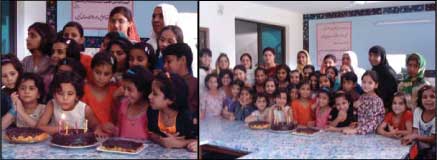Saba Trust Instills Hope in Pakistani Female Orphans
By Madihah Akhter
 |
Bushra Aslam teaching the girls |
A group photo of the girls |
A few of the youngest girls |
All the girls are so small, swarming around me like bees to honey with smiles on their faces and curiosity in their eyes. They are excited to see a new visitor and the youngest girls immediately pull on the end of my kameez, hoping I will play with them first.
Saghir and Bushra Aslam have been contributing to Pakistani and Islamic causes for over 40 years, and 15 years ago the couple decided to convert their Rawalpindi home into an orphanage. Only in the past few years has the Trust been able to physically house, feed, clothe, and otherwise take care of the orphans.
As I drove up the windy road in Gulrez and spotted a large house with ‘Saba Trust’ largely printed in red lettering, I realized this building was far from the orphanage I had in my mind’s eye. Everything is brand new and sufficient for the 25 girls it houses. Construction that began in June 2006 has now been completed and the Saba Home consists of a five-story marble walled structure that is connected to the Trust’s headquarters. The Home contains classrooms, a large playroom, two libraries, a cafeteria, gardens, a computer lab and sleeping rooms.
The girls are awake and by 7 every morning they have breakfast, a morning assembly, and classes by 8. Each day consists of class from 8:00 AM-1:30 PM, followed by lunch, namaaz, naptime and then an evening of homework.
Unfortunately, not everything is as surreal as it seems. Bushra Aslam, one half of the Saba Trust endeavor, explains the girls are mostly from the mountain villages in Northern Pakistan. Some girls didn’t know how to use a bathroom when they came here and had to be potty-trained, as well as taught how to maintain good hygiene and the importance of consistent hand washing.

Blowing out the candles on a birthday cake. The little girl was turning 7 (Right): Group photo in the cafeteria
Although young and now potty-trained, these girls already have their own terrible pasts. Bushra Auntie points out a pair of girls with matching headbands. These sisters don’t call each other “Apa.” This is because the elder sister, only senior by 1½ years, remembers her mother. She particularly remembers that her father lit her mother on fire until nothing was left but charred remains. The younger sister remembers none of this as the incident occurred when she was only 6 months of age. She calls their maternal aunt, who raised the two after their mother was murdered, by the affectionate name of “Amma.” The memory (or lack thereof) of their mother separates the two sisters who share a bunk bed and big chocolate brown eyes that always seem to be twinkling with mischief. One can only hope and pray that time will heal the division between these two, who no longer have a stable pair of parents in their lives.
Although Saba toys with the traditional definition of orphan, as some of the girls have a mother or father that comes to visit them, the girls are often taken in from less than desirable living situations. A single parent often works the entire day just to bring a relatively small amount of food back to the family’s one room house where often 3-4 family members reside.
One mother explains to me that letting her daughter go was one of the most difficult things she had to do, but after being widowed and remarried to a man who didn’t want to be a father to her children from a previous husband, she had no choice. She works very far from her home and also works long hours, so she stops by to see her daughter whenever she can. I could see the pain in this woman’s eyes as her head begins to roll listlessly to one side and exhaustion takes over her body. Yet even she knows that her daughter is already living a better life than she did as a child because she has access to an education. This is a dream that all Pakistanis, regardless of social class, wealth and status, share.
 |
Madihah Akhter applying medicine on a girl’s face |
Saghir Aslam |
A mural on the wall painted by Basheer John, famous Pakistani artist |
It is no secret that orphans in Pakistan, especially girls, have no place in society and even less hope for education, let alone a future. Unstable family histories aside, the most admirable quality inherent in this orphanage is undoubtedly hope. Sometimes having it all in the tangible sense leaves something to be desired. These little girls are resilient and moreover, they are loved, safe and happy.
While in the presence of these young girls, I felt the joy that washes over the marble walls when a five-year-old successfully completed her 9 times table or one’s shoes are replaced because their rapidly growing feet no longer fit into their chappals. Children have the ability to withstand some of the most dire circumstances because they view the world through a child’s eye, where things that are broken can be mended and dreams can one day be achieved. With the help of the Saba Trust, these girls now have the opportunities and the hope to become a teacher, a doctor, a social worker or perhaps even the future leader of Pakistan.
For more information, please visit www.sabatrust.org
-------------------------------------------------------------------------------------

